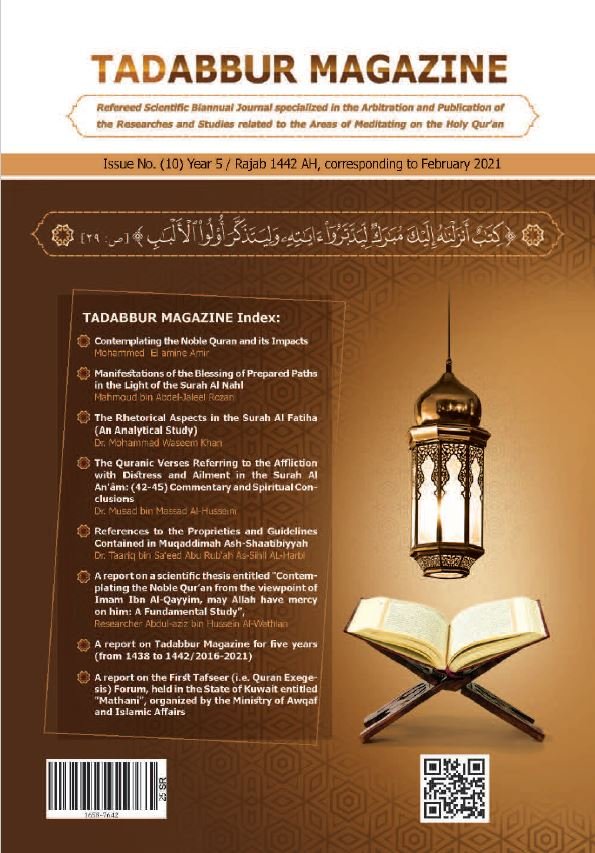The Quranic Verses Referring to the Affliction with Distress and Ailment in the Surah Al An’âm: (42-45) Commentary and Spiritual Conclusions
Main Article Content
Abstract
Through the verses in the Surah Al An’âm, the research addresses an issue of paramount importance, which is afflicting humans with distress that connotes want, poverty and ailment after sending the prophets and the resistance they received from their relevant peoples so that they can plead with and turn to their Lord with submission and humility to eliminate them from their suffering and confer upon them His bestowals and boons. However, those peoples persisted with their obstinacy and deviations without trying to learn from Allah’s warnings and signs. So He decoyed them by endowing them with lavish material possessions and all desirable conveniences until they behaved exultantly, ungratefully and arrogantly. Thereupon those rebellious peoples deserved divine punishment and were unexpectedly annihilated.
The aim of the research is to reflect on these verses which cast light on the state of people who behaved such a way and brought down upon themselves exemplary punishment. Since this is a normative precedent established by Allah, we must beware of the conduct and the example of those wrongdoers who were tempted and doomed to destruction so that we can protect ourselves against their fates. The approach used in this research was expanding on the relevant verses, their objectives, the lessons to be learned from them by reviewing the statements and accounts of the Muslim exegetes according to the original reliable sources and references. All of this is intended to derive parables and serious lessons to exercise caution and avoid the same fate.
Downloads
Article Details
Conference Proceedings Volume
Section

This work is licensed under a Creative Commons Attribution-NonCommercial 4.0 International License.
Indicating to the intellectual property, copyrights, and open access right:
According to the Budapest Initiative 2002; tadabbur Journal, which is issued by Khibrat Taibah For Research and Studies in Medina, provides free open access to its publications, and applies the Creative Commons license:
Attribution- Non-Commercial 4.0 International (CC BY-NC 4.0) for the works it publishes from peer-reviewed scientific research and reports, which are freely available on the Internet, and which allows any user to read, download, copy, and distribute (Convert), print, search, or create links to the full texts of the journal’s research and publications, and analyze them in an automatic manner for discovering them, sending them as software data, or using them for any other legal purpose, without financial, legal, or other technical barriers beyond those related to Internet access.
It also highlight that the only barrier to reproduction and distribution, and the only role of copyright in this field, is the necessity of granting the authors of the journal’s research and reports and the publisher the journal; Control over their works, and the right to official recognition and reference citations.
How to Cite
References
«البرهان في تناسب سور القرآن»، الغرناطي، أحمد بن إبراهيم الثقفي (المتوفى: 708هـ)، د.ط، وزارة الأوقاف والشؤون الإسلامية - المغرب، 1410هـ.
«التحرير والتنوير»، ابن عاشور، محمد بن عاشور التونسي (المتوفى: 1393هـ)، ط1، الدار التونسية للنشر - تونس، 1984هـ.
«تفسير ابن أبي حاتم (تفسير القرآن العظيم)»، ابن أبي حاتم، أبو محمد عبد الرحمن بن محمد الرازي (المتوفى: 327هـ)، ط3، مكتبة نزار مصطفى الباز - السعودية، 1419هـ.
«تفسير ابن عطية (المحرر الوجيز في تفسير الكتاب العزيز)»، ابن عطية، أبو محمد عبد الحق بن غالب بن عطية الأندلسي المحاربي (المتوفى: 542هـ)، ط1، دار الكتب العلمية - بيروت، 1422هـ.
«تفسير ابن كثير (تفسير القرآن العظيم)»، ابن كثير، أبو الفداء إسماعيل بن
عمر بن كثير القرشي الدمشقي (المتوفى: 774هـ)، ط2، دار طيبة للنشر والتوزيع، 1420هـ.
«تفسير الألوسي (روح المعاني)»، الألوسي، شهاب الدين محمود بن عبد الله الحسيني (المتوفى: 1270هـ)، ط1، دار الكتب العلمية - بيروت، 1415هـ.
«تفسير الرازي (مفاتيح الغيب)»، فخر الدين الرازي، محمد بن عمر بن الحسن التيمي، (المتوفى: 606هـ)، ط3، دار إحياء التراث العربي - بيروت، 1420هـ.
«تفسير السعدي (تيسير الكريم الرحمن في تفسير كلام المنان)»، السعدي، عبد الرحمن بن ناصر (المتوفى: 1376هـ)، ط1، مؤسسة الرسالة، 1420هـ.
«تفسير الطبري (جامع البيان في تأويل آي القرآن)»، الطبري، محمد بن جرير (المتوفى: 310هـ)، ط1، مؤسسة الرسالة، 1420هـ.
«تفسير القرطبي (الجامع لأحكام القرآن)»، القرطبي، أبو عبد الله محمد بن أحمد بن الأنصاري، (المتوفى: 671هـ)، ط2، دار الكتب المصرية - القاهرة، 1384هـ.
«السنن الإلهية في الأمم والجماعات والأفراد في الشريعة الإسلامية»، الدكتور: عبد الكريم زيدان، د.ط، وقد طبع بمؤسسة الرسالة، بيروت - لبنان، عام 1413هـ - 1993م.
«السنن الإلهية في السيرة النبوية»، الدكتور: رشيد كهوس، د.ط، دار السلام، القاهرة، عام 1438هـ.
«السنن الإلهية في القرآن الكريم، ودورها في استشراف المستقبل»، عماد خصاونة - خضر قزق على الرابط: https://andalusiat.com
«صحيح الإمام البخاري»، البخاري، محمد بن إسماعيل أبو عبدالله الجعفي، ط1، دار طوق النجاة، 1422هـ.
«صحيح الإمام مسلم»، مسلم بن الحجاج النيسابوري (المتوفى: 261هـ)، د.ط، دار إحياء التراث العربي - بيروت، د.ت.
«صحيح الجامع»، الألباني، محمد ناصر الدين (المتوفى: 1420هـ)، د.ط، المكتب الإسلامي، 1401هـ.
«مسند الإمام أحمد»، أحمد بن محمد بن حنبل الشيباني (المتوفى: 241هـ)، د.ط، مؤسسة الرسالة، 1421هـ.
«مفهوم السنن الإلهية في القرآن الكريم وعلاقته بمباحث العقيدة»، الأستاذ:خالد محمد أبو الفتوح على الرابط: http://almoslim.net/elmy/290530.
«مفهوم السنن الربانية في ضوء القرآن الكريم»، الأستاذ الدكتور: رمضان خميس زكي. www.riyadhalelm.com ›





